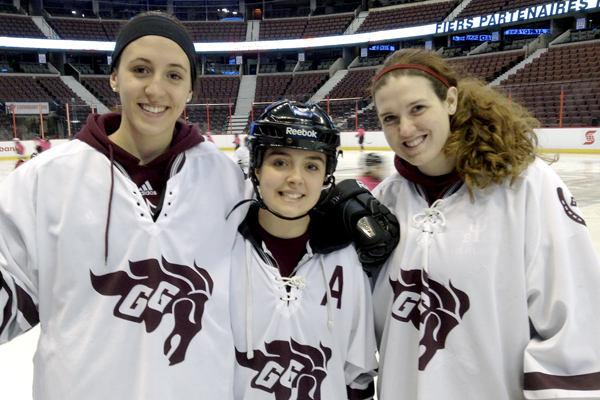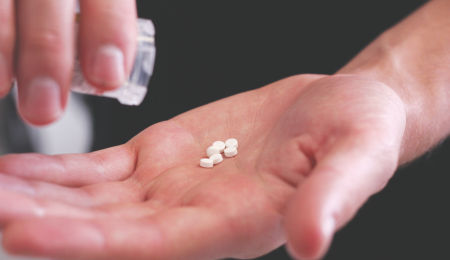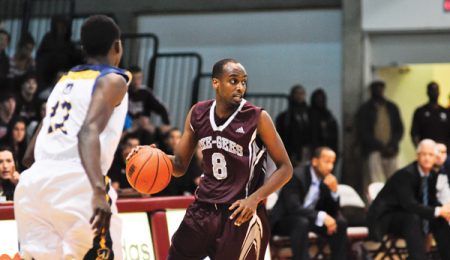Gee-Gees and Olympic medal winners mentor future of women’s hockey in Canada
Photo by Sarah Nolette
Hundreds of young ladies who represented hockey teams from across eastern Ontario came out to the Canadian Tire Centre for group coaching sessions on the same ice the Ottawa Senators call home. These youngsters had the opportunity to be coached by not only the University of Ottawa Gee-Gees and Carleton Ravens women’s hockey teams, but also two of the most prestigious figures in Canadian women’s hockey.
On March 23, the 10th annual Scotiaback Gilfs HockeyFest took place in Ottawa, an event that promotes and coaches young females in hockey. Cassie Campbell-Pascall and Tessa Bonhomme have collectively brought home Olympic gold medals for Canada in three of the last four winter games. Both have competed at the highest levels for women’s hockey and continue to help out in the communities to be role models for girls pursuing their puck dreams in Canada.
Campbell-Pascall and Bonhomme came to Ottawa to work with the next generation of women that could be filling their skates in the near future.
“They really can conquer anything and do anything,” said Bonhomme. “I’m happy just to be a part of it. Cassie Campbell has been one of my role models growing up and still is to this day, and to be able to work out here with a lot of the younger girls moving forward is a fantastic opportunity.”
“It’s pretty special for me,” said Campbell-Pascall. “I remember growing up and going to the Eddie Shack Hockey School and me and my friend were the only two girls. To see a camp like this with 250 participants is pretty thrilling for me and hopefully one day we see some of these girls playing in the Canadian Women’s Hockey League (CWHL) or on the national team.”
Midway through the day, both Olympians taught the crowd of girls and parents the lessons they have learned, and voiced the obstacles, challenges, and victories they face in their careers.
The Gee-Gees had much to learn from the experience and it was easy to read their excitement and eagerness to help the next generation of young players.
“I think it is very different from playing hockey to teach,” said first-year human kinetics student Vickie Lemire of the Gee-Gees hockey team. “You get to learn a lot of things. It’s going back to the basic stuff and it’s always fun to teach the little kids so they can take us as an example. It’s always a rewarding experience.”
Not only did the Olympians coach their skills to the young girls, but the university players received some mentoring from them as well.
“It’s more in the dressing room stuff with the older girls,” said Bonhomme. “They’re our peers, they are going to be playing in our league, the CWHL, in a couple of years. It’s nice just to get to know them and chat them up and see where they are from and what their future has in store.”
“It is important for them (the younger girls) to not only interact with the national team players,” said Campbell-Pascall. “They get an opportunity to meet some of the university players, and they have an option when they grow up to play CIS (Canadian Interuniversity Sport) hockey, which is a great calibre level of hockey, and get an education going NCAA (National Collegiate Athletic Association) or CIS — whatever they choose. I think it’s important for them to see some local heroes as well.”
Both Olympians addressed the growth of women’s hockey on a world scene. With the rise of social media, the viewership was through the roof in this year’s Olympics. Campbell-Pascall and Bonhomme believe one day in the future there will be a professional league for women. This is key because even some of the women playing at the highest level in the CWHL have to work two or three jobs along with playing hockey.
“I can only imagine and dream that they’re going to have a league to play in one day where they are getting paid and that is their job,” said Bonhomme. “I think we are on the right path again, we are going to take baby steps and I think the next Olympics is going to be huge.”
When Olympians can come together with collegiate athletes and young girls, it speaks to the growing power of women in hockey. Through events like these, it enforces the fact that women’s hockey has a very bright future, and is definitely here to stay.





